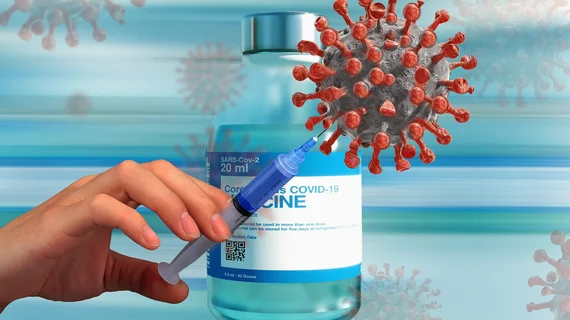Radiologists’ public service message underscores need to educate patients on COVID-19 vaccine side effects
As mass COVID-19 vaccination rolls out across the globe, radiologists say more education is needed to warn patients about potential lymph node side effects that can mimic cancer.
The two-dose shots approved in the U.S.—Pfizer-BioNTech and Moderna—both have higher reported rates of axillary swelling compared to past vaccines, imaging experts explained Friday in Radiology: Imaging Cancer. Palpable lymphadenopathy may be a diagnostic challenge for radiologists and other providers, particularly among patients with a history of cancer.
And while a number of healthcare groups, including the American College of Radiology and Society of Breast Imaging, have offered up recommendations to help providers avoid unnecessary procedures and costs, the authors say additional efforts are needed for patients, too.
“Widespread patient education regarding vaccine-induced lymphadenopathy is needed, especially as this may be mistaken as a sign of malignancy,” Wendy Tu, MD, a radiologist at Harvard-affiliated Brigham and Women’s Hospital, and colleagues wrote April 9.
Imaging societies, clinicians and news media must spread awareness to educate the public about this side effect and help limit patient anxiety, Tu et al. added.
During vaccine appointments, those administering doses should underscore lymph node swelling as a normal immune response. More infographics may help in this effort, and for informing patients on when to best schedule routine imaging exams.
Providers should pay particular attention to those with swelling that doesn’t resolve, patients with lymphadenopathy in multiple sites and individuals with cancer to ensure clinical follow-up.
“We write this editorial as a public service message at a time where other countries are starting mass vaccination programs with the goal of preventing unnecessary nodal biopsies and alleviating patient concern,” Tu and co-authors explained.
There have been a number of studies and guidelines published regarding vaccine-related lymph node abnormalities, mostly geared toward providers.
Most groups, including SBI, recommend patients schedule routine screening exams before receiving their first dose or 4-6 weeks after their second.
And early last month, University of Massachusetts Medical School/Memorial Health Care oncology imaging experts suggested performing PET/CT exams at least two weeks after vaccination in those with cancer that may be challenging to interpret, i.e., those involving lymph nodes, such as breast cancer, lymphoma and others.
Read more on how radiologists should manage side effects here, including those found during breast imaging exams.

